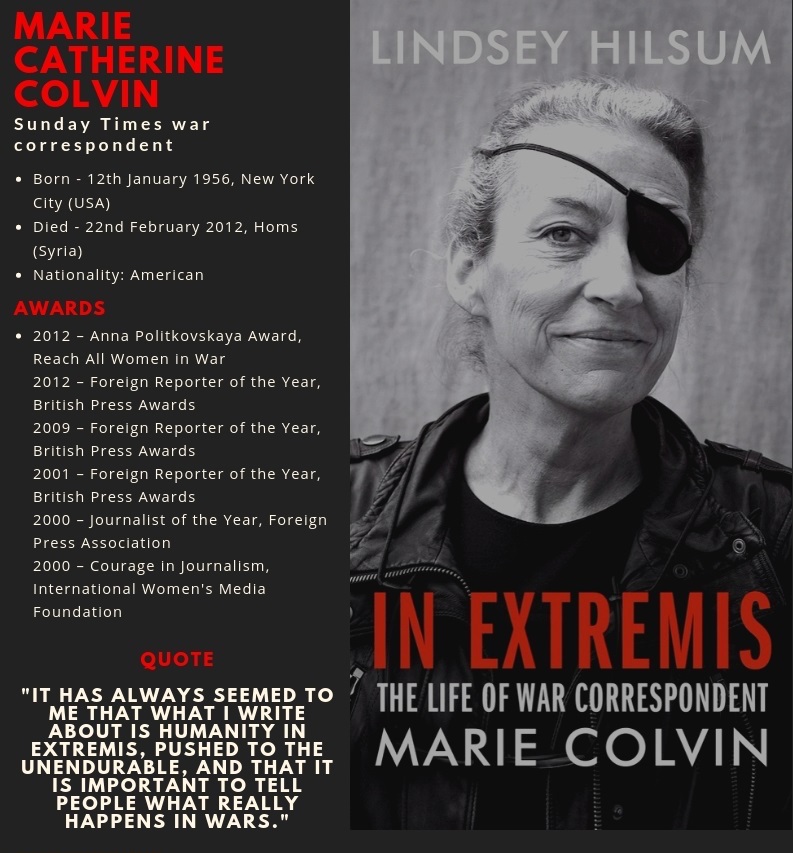The biography of veteran war correspondent Marie Colvin was previewed at an Esquire magazine event in St James’s on Sunday, ahead of its public release on 1 November.
In Extremis was written by Channel 4 international editor Lindsey Hilsum, a close friend of Colvin’s who spoke to her on the day she was killed by a bomb in Syria in 2012.
BBC journalist Kirsty Lang led the interview which delved into Colvin’s brave professional life, tumultuous personal life and her friendship with Hilsum.
Hilsum said: “Marie was never happier than covered in mud in a trench. That was her thing. And she was totally egalitarian in the sense that the view of the peasant woman or the conscript was the most important view to her.
“She also knew Yasser Arafat well and Gaddafi but this view from the ground, this was her thing. But she also had the most glitzy and glamorous life in London with aristocratic friends.”
Born in New York City, Colvin joined the Sunday Times in London in 1985, where she worked until her death at age 56.
Hilsum said: “Marie’s thing would be to go in further and stay longer. That’s the essence of some of her most brilliant stories for the Sunday Times. Everyone else would have gone home as the hot news is over but she would still be there digging, digging, digging, finding out more.”
The book details the personal cost to Colvin of reporting war even before her premature death, including losing sight in one eye following an ambush in Sri Lanka and her problems with alcoholism.
Hilsum said: “The title of the book In Extremis comes from a quote from Marie saying what she wrote about was people living their lives in extremis in war, but that was how she lived her own life as well.”

She added: “There were so many other nightmares that she had which were all about this struggle against male power. She is there fighting to be herself and to survive. I think that’s all mixed up with her personal life and the fact that war is on the whole perpetrated by men.”
The two journalists first met in 1998 in Djibouti while heading out to cover the war between Ethiopia and Eritrea.
The final time Hilsum saw Colvin was in February 2012, the month she died.
The two had dinner with Jim Muir of the BBC and Neil MacFarquhar of the New York Times in Beirut.
Hilsum said they talked about if they should get smuggled into the Baba Amr district of Homs in western Syria which was under attack. Everyone except Colvin decided it was too dangerous.
Colvin and her photographer Paul Conroy went on alone, gaining access to Syria by crawling through a sewage tunnel for a kilometre.
Hilsum said after Colvin arrived: “She wrote an extraordinary story about the ‘widows’ basement’ which was the place where the women and children hid. This was very significant because the Syrian government were saying that there were only terrorists in this place, but her story was the evidence that all these women and children were there.”
As the Syrian government forces drew closer, Colvin left Baba Amr. But she later returned with Conroy due to feeling like she had abandoned the women and children, according to Hilsum.
“They get in and the situation is really dire and then she calls me. They had Skype on a satellite phone. I was furious with her,” recalled Hilsum.
She detailed their last conversation: “I said, ‘What the hell are you doing? Why have you gone back in?’ She said, ‘Lindsey, this is the worst we’ve ever seen.’ I said, ‘Marie, I know but what’s your exit strategy?’ and she said, ‘That’s just it, we don’t have one. I’m working on it now.’”
Marie Colvin was killed around eight hours later. According to Hilsum, Syrian government mortar targeted the media centre where she was staying. Paul Conroy was injured but survived.
Hilsum said that final conversation was what prompted her to write Colvin’s biography as she couldn’t get it out of her head.
When asked if there was one thing the public didn’t know about war that might change their perspective, Hilsum said: “I think Marie felt really strongly that she could make a difference and I’m a bit more cynical or sceptical. I’m not sure we can do that.
“But I think information is important for its own sake. I think it’s really important that nobody will ever be able to say afterwards we didn’t know.”
In Extremis: The Life of War Correspondent Marie Colvin by Lindsey Hilsum is published by Chatto & Windus (£20).
